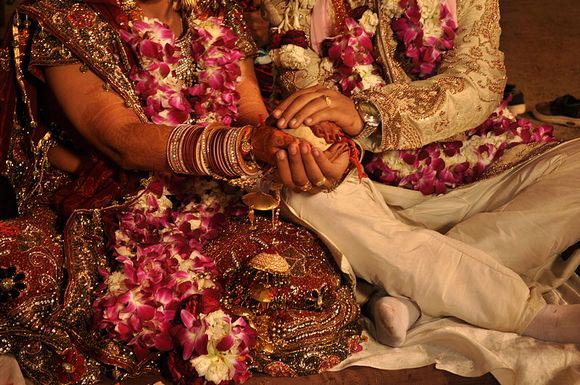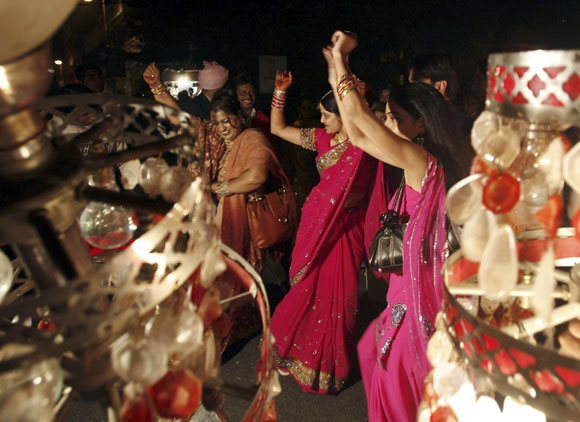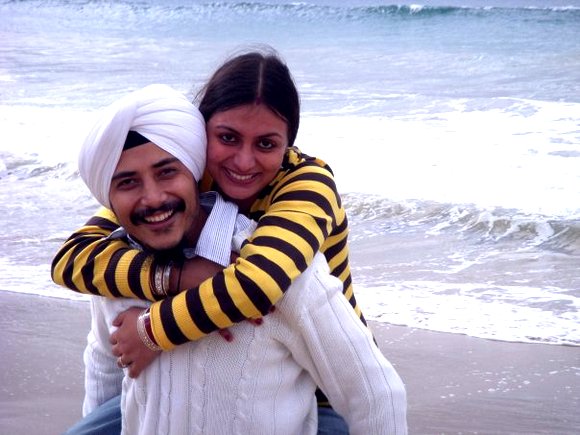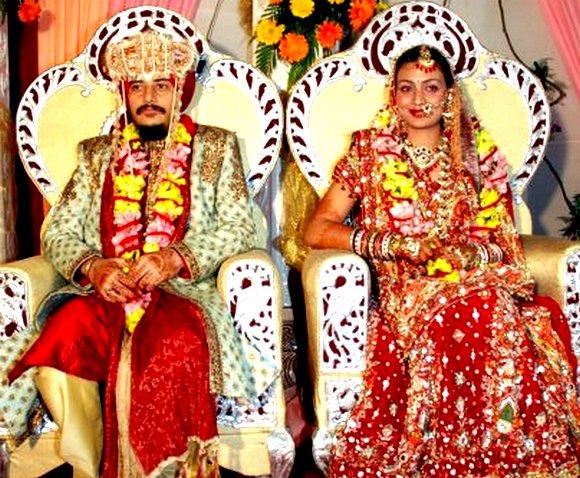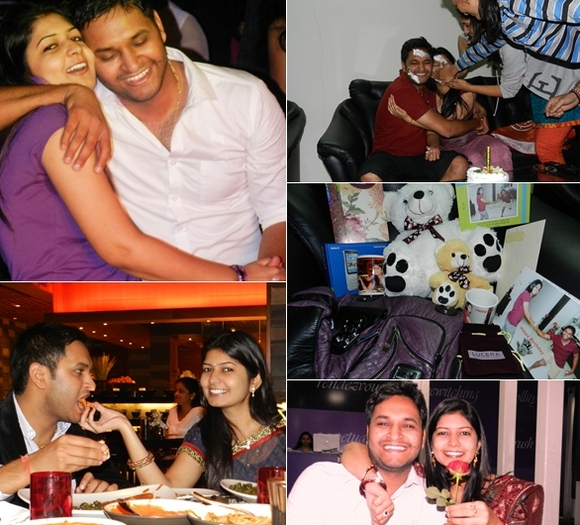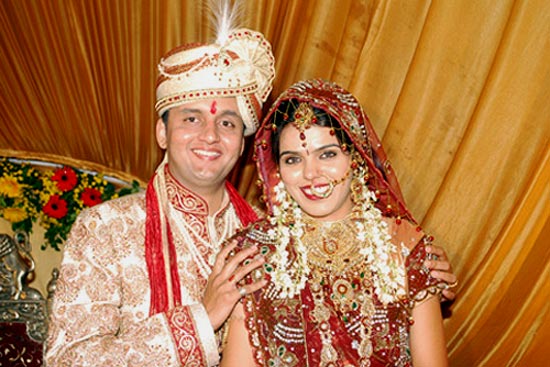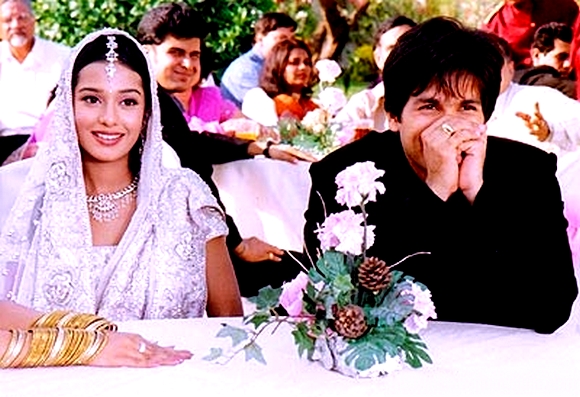 | « Back to article | Print this article |
Why young Indians seek love in arranged marriages
As young Indian couples seek love in arranged matches, we explore the uniquely Indian concept of 'arranged-love' marriage.
All our lives, the only thing that most of us seem to be chasing is that one moment.
For some, it is that moment when they get their dream job or that house or the car they have been eyeing; for others, it is when their stocks go through the roof and the cash registers start ringing; and for others it is that precise moment when by some divine providence their paths cross with that one person by whose side they would like to be for the rest of their lives.
It came as a bit of a surprise to me when I was recently told that the last of the above scenarios is perhaps the most difficult. Finding love apparently is a tough job, especially in a big city.
"Think of it," a cousin popped on an online chat, "How many hours do you spend outside of your office? How often do you socialise or when was the last time you met a new person."
I argued that my job requires me to be on the field quite often and that I do meet at least one new person every week. However, I confessed that after a four-hour commute to and from work, the only thing I can see before me is my bed so socialising was out of the question.
Pat came the response: "What if your job was to nail you to the desk?"
After about 20 minutes of trying to make up situations to prove my point, I gave up. He was right. My chances of meeting anyone, let alone someone who I could spend my life with, were very slim indeed.
Why young Indians seek love in arranged marriages
Off the top of my hat I could think of at least half a dozen people my age -- both women and men in their 20s -- who in the recent past have asked to be set up -- not for a one-night-stand but rather for long-term commitment.
"There just aren't any guys," a young female friend once told me. Surprisingly, a male friend had the same gripe about women. While in retrospect I am kicking myself for not setting the two up (one of them has left the city for good) it occurs to me that they were both wrong. And that they were right too.
Sure there are enough single women and men floating around -- in a country of a billion whose average age is some 26 to 27 years, it is statistically impossible not to have a substantial population of singles -- but the avenues for them meeting each other are shockingly limited.
An arranged marriage setup emerges as the most reliable option for many young Indians.
However, like every institution, the concept of arranged marriage has evolved too. And in some cases, parents and children are settling for a 'middle path', one that seems acceptable to both parties.
Thus, in an 'arranged-love' marriage, the two young people get introduced to each other because of their families and having received the consent from elders of both parties, the young couple sets out on a courtship period that could last for as little as a few months or as much as a year-and-a-half to two years after which they (usually) tie the knot.
This, of course, is not the hard and fast definition. Like everything else, things are quite flexible. However there are some unwritten rules in this arrangement. Pre-marital sex is a no-no, obviously.
"Also if nothing materialises neither family gets involved in mud-slinging," says Seema Hingorrany, a well-known Mumbai-based clinical psychologist. "It also means that the girl and the boy have a larger say in the matter."
This is, of course, is a far cry from how most of our parents met. The meetings would usually last for less than an hour amidst much awkwardness on part of both families and an agonised prospective young couple wishing for the earth to swallow them. Then under the garb of 'letting the couple talk in private' the two would be sent off to another room where sideways glances and few pleasanteries would be exchanged for a full t-e-n minutes before the groom's family would take their leave.
Now however, young Indians it seems have the option of really getting to know the person they are hoping to marry.
Why young Indians seek love in arranged marriages
Rashmi Kalra Saluja was in her second year of college in New Delhi when her parents introduced her to Satvinder.
"Someone said these two people will look nice together. Both families met and we were introduced," she tells me over the phone from Jharkhand where she is now settled.
Neither family was keen on meeting at the other's home so they made a trip out of it! Madhuban, a pilgrimage spot, seemed like a good place to set up the prospective couple.
"We were given time to spend with each other and as we walked around, I asked him about himself and his hobbies," she says, "He seemed like a really genuine guy."
At the time, Kalra was studying mass media at Amity University and she was adamant about completing her education before she walked down the aisle.
This in turn gave the couple a good two years of courtship period. Most of this time was spent on the mobile phone talking and "getting to know each other properly."
"We had liked each other anyway. He tells me it was love at first sight for him. I thought 'mummy-papa hai toh let's just say yes'!" she giggles.
And since it was a family approved match, it took a lot of pressure off Kalra. If she was meeting the boy, there were no questions asked because it was a given that the two should meet.
"Everyone knew everything," she says, "On most occasions both parents knew we were meeting. So I did not find the need to hide anything."
Why young Indians seek love in arranged marriages
Dating in India is usually frowned upon. And a 'date' is often used interchangeably with 'secret rendezvous'.
But this was different. The parents' approval changed things. As Kalra tells me, none of their meetings ever "felt like a date"!
So even when she refused to talk to him for forgetting the day they first met and he flew down from Guwahati to beg for an apology without his parents knowing, Kalra was never afraid of being caught or spotted.
Needless to say, there were rough patches too, ones that they got over by simply understanding that they came from two different worlds.
She had lived in a hostel; he was brought up in a traditional north Indian joint family. She enjoyed an occasional night out with her girlfriends; he would worry about her safety.
Then there was one particular occasion when after a hard night out, Kalra couldn't take his calls for through a good part of the next morning.
"I woke up and saw some half a dozen missed calls from him. I returned his call and told him the truth. He asked me if I was fine and told me that he was busy and that he would call back. I thought this was it.
"After almost an hour, he did return my call and told me that he was not upset but rather just worried. He didn't pester for information or ask me any more questions.
"That was what really attracted me to him. It made me realise that he was indeed open-minded and didn't judge me over that one incident," recalls Kalra.
Why young Indians seek love in arranged marriages
Umesh Tiwari, who hails from Rajasthan, did not have the luxury of getting to know his partner for as long as Rashmi and Satvinder did.
As an IT professional, Tiwari works in Pune, one of the select cyber hubs in the country and each time he visited his parents, bride hunting was perhaps the only activity they engaged in.
By the time he met Richa during one such traditional bride-viewing session, he had already met over 15 prospective matches in 18 months!
Sparks flew and both knew they simply had to take it forward.
After a series of phone calls, it seemed to them that they were indeed made for each other.
"Our first phone call was a traditional one," Tiwari says, "But with each progressive call, we opened up a little bit more. Then we made a pact -- we wouldn't lie to each other, that past is what has already happened and the present and future is what we have! Let us become best of friends, never manipulate each other, and speak our minds. Soon, I became used to her voice on the phone and I would sing Hindi songs during late night talks while my roommates laughed at me. We realised that we had become very good friends," he says.
On February 14, over two months since they first met and after running up a fairly large telephone bill, Tiwari proposed.
Then on one occasion, as Richa got selected to attend a conference in Jaipur, Tiwari made his way to the Pink City, where they secretly met and "we had our first kiss".
"Those few days made a difference," Tiwari says. Because although they had met each other earlier, the days they spent together in Jaipur gave them a sense of who the other person was.
Together, they started building a website announcing their marriage. I pleasantly discovered that richawedsumesh.com is a fairly comprehensive site that not just has their wedding photos and videos, but also a section that takes you through a list of to-dos and suggests an itinerary if you are visiting Rajasthan for the first time.
Less than four months after he proposed and we suppose a few weeks after the website was up, Richa and Umesh tied the knot.
Why young Indians seek love in arranged marriages
In an arranged-love marriage, the mobile phone often becomes an all-important gadget, especially when the two people concerned are in different cities.
As is the case with most long distance relationships, Himanshu Bhatnagar who teaches at the ITM University in Gwalior would reach out to Nidhi, the woman his parents had introduced him to over the phone. Apart fron running up a huge telephone bill, the two had little or no option of getting to know each other better. It was the only connection the two had and one that they were thankful for.
Telephone also poses unique problems. Communication is largely verbal (barring the occasional text message) and you pretty much judge the other person on the basis of what s/he sounds.
Sonal Choudhry who was in Ranchi while she courted Ashish Jaiswal who lived in Gurgaon did so over the phone. In the 18 months from the time they first met to the day they got married, she'd met the man she would marry and his family only thrice.
Sooner rather than later, she began to get the feeling that the man she was seeing before her was vastly different from the one she was would listen to over the phone. She realised suddenly that she couldn't be talking or seen talking the way she did over the phone and had to be conscious about her body language.
Choudhry also realised that she had only seen one aspect of her husband Ashish Jaiswal's personality. She did know that she had married an introvert who rarely ever revealed his emotions, but she hoped that he would stand up for her when the time came.
But by her own account, the first year of their marriage caused her a good amount of stress. At one point, she even asked herself if she could carry on in this way.
As their marriage completed a year, she began to seriously worry. "Then I suppose we both changed," she says, "We began to realise what the other person wanted. So the second year has been a lot better. Today we cannot live without each other."
Initially Choudhry thought that the change was due to the baby she was expecting. "But now I realise that he does love me for who I am," she says.
Illustration: Uttam Ghosh
Why young Indians seek love in arranged marriages
For what they are worth, families -- before or after marriage -- are almost always a problem. Sure, it helps to have an elderly person's voice around when you are taking the biggest decision of your life but as marriage counsellor Dr Sanjay Chugh tells me, "too much of mixing with each other's families prior to the wedding could create tensions".
In an e-mail response, he points out, "Involving each other in every decision related to the family could lead to confusion and might be perceived as unnecessary interference.
The in laws might begin to have certain expectations which the boy/girl might be expected to fulfill even before they are formally married and that might be uncomfortable for either person.
Exposure to each other's family dynamics can get overwhelming and create unnecessary nervousness."
Yet the concept of 'arranged-love' marriage is indeed gaining popularity for a wide variety of reasons.
For starters, as Dr Chugh says, the couple does not have to go through the stress of either being caught, lying, cooking up stories or dealing with the fear of being disapproved/rejected.
"For the parents too, since the other family is known, the background, the person in question etc are verifiable, there is greater acceptance and hence, mental relief.
The courtship period also gives the families opportunities to know each other better, to get over the initial awkwardness or jitters and to develop a certain level of rapport and affection."
Dr Hingorrany suggests that with divorce rates going up and young Indians seeing love marriages crumble before them, an arranged match that also gives them the freedom to date seems to be a great idea.
"Also, they find it better to rope in parents for guidance and let things (between themselves and their prospective spouse) unfold slowly."
Illustration: Uttam Ghosh
Why young Indians seek love in arranged marriages
When you think of it, the concept of 'arranged-love' marriage is not new. Not at least in Bollywood.
Rajshri, the film company that is known for producing 'family' movies (ones that don't just provide family entertainment but whose also plots revolve around large Indian joint families), have produced quite a few movies where the lead couple meets during a family function or is set up by friends of their families.
Salman Khan and Madhuri Dixit's characters in the 1994 blockbuster hit Hum Aapke Hain Koun meet during the wedding of his brother to her sister.
Hum Saath Saath Hain, their 1999 production, had at least two lead couples who probably would not have met had it not been for some family connection.
But it was Rajshri's 2006 release, Vivah, where the idea was explored to the fullest. Shahid Kapoor's and Amrita Rao's characters are introduced to each other in a traditional manner -- across a cup of chai and samosas – with both families looking over their shoulders.
As they get to know each other in the months that follow, the two fall in love. The boy of course is smitten by her beauty and the girl blends into the family like all traditional Indian brides must.
Closer home, in the 2011 release Zindagi Na Milegi Dobara, Abhay Deol's and Kalki Koechlin's characters seem to have a similar if not the same sort of an arrangement.
Although you are not told exactly how they meet, it is obvious that their families have known each other before the two started some sort of a tentative relationship.
It is also one of the reasons why calling off his engagement is unimaginable for Deol. "Our parents are involved," he argues with his friends at one point when they suggest he walk away.
Why young Indians seek love in arranged marriages
When I ask Hingorrany if it makes young folks more serious about the relationship and probably work actively towards solving the problems rather than throwing in the towel as they may have done if their parents were not involved in the process, she replies with an emphatic yes.
"Subconsciously, they are always aware that both the sets of parents know what they are up to. So they are usually subdued in conflict resolution and probably less impulsive too. They know there are strings attached."
Dr Chugh is more matter-of-fact: "(Even though) some may feel responsible since there are families involved, it depends solely and completely upon the people involved. But we also see those people who would conveniently pass the buck on to the family and blame them for all the wrong that comes their way."
In the process of interviewing people for this story, I took the liberty of asking a friend over an IM chat why he chose to get married to a girl his parents picked for him.
From what he said, it seemed that after an eight-year-old failed relationship and a six-month mourning period, it was to him an obvious choice.
After about four weeks of having spent time with each other in person and over the phone, he decided that she would be the one.
Somewhat incredulous, I asked him if he did not think he had rushed into it. Four weeks was a fairly short time, especially when you have known someone for eight years, I pointed out.
A long pause followed. Suddenly I was unsure if I had crossed the line. I waited.
Then the typing began. I could almost see him poring over his PC as he typed. Finally, about half a minute later, his reply appeared on my screen:
"My friend, life moves on..." he said, "And honestly, all it takes is just a moment."
Illustration: Uttam Ghosh
